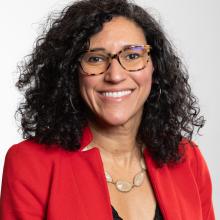Bio:
Bernadette Sánchez is a Professor of Human Development and Learning in the Department of Educational Psychology in the College of Education at the University of Illinois Chicago. She is an expert on the role of mentoring relationships in the healthy development and educational experiences of urban, racially minoritized adolescents of color, particularly Latinx and African American youth. Her research also examines the resilience and resistance of youth who are marginalized by U.S. society, and the racial and ethnic processes (e.g., racial discrimination, racial/ethnic identity) that impact the healthy development of youth and their relationships with mentors. She has received funding from the National Institutes of Health (NIH), the National Science Foundation (NSF), and the William T. Grant Foundation. Bernadette’s latest work examines a) the impact of a cultural humility intervention for volunteer mentors on their attitudes, interactions and relationships with youth, and youth outcomes (e.g., ethnic/racial identity), and b) the role of a group mentoring program and youth-adult relationships in adolescents’ science identity. She was a Distinguished Fellow of the William T. Grant Foundation and currently serves on the Research Board of the National Mentoring Resource Center. Finally, she is a first-generation college student and received my B.A. in Psychology from Fairfield University and M.A. and Ph.D. in Community and Prevention Research from the University of Illinois Chicago.
Have you recently or do you currently serve on any SRCD Committees, Councils, or task forces?
SRCD Latinx Caucus
Do you have a mentor or mentors who have been instrumental to your career and, if so, who and how?
In graduate school, my mentor was Dr. Karina (Olga) Reyes, who was nurturing and taught me how to write and do research. She was detailed oriented, had high expectations and my biggest cheerleader. She was exactly the kind of mentor I needed at that time, especially as a first-generation college student who felt clueless in the beginning of the PhD journey. Karina was like my academic tía/auntie – she provided emotional support, understood me as a fellow first-gen Latina scholar, while at the same time telling me the truth and holding me accountable. Another important mentor is Dr. David L. DuBois, who is a youth mentoring researcher, and I got to know early in my career when I was a new Assistant Professor. He gave me feedback on my research and writing ideas, provided the opportunities I needed to get connected to other researchers in the field, and helped me get external funding awards. I attribute a lot of my career successes to his guidance and support and belief in my ideas.
What advice would you give to a grad student beginning their Ph.D. studies in developmental science or related field?
Don’t do this journey alone. Find peers in or outside your field who are going through a similar journey so you can support each other. Network with folks in your department, across your university/college and outside your institution. Meeting a variety of people will help you see that there are multiple paths and there isn’t one right way to do a PhD and to pursue your career. Also, don’t forget to have fun and enjoy your life. You only live once and life doesn’t stop because you’re in a PhD program.
Hobbies?
Running along Chicago’s lakefront by myself or with my neighborhood run club; reading fiction; watching my kids do the things they love (e.g., dance, sports).
